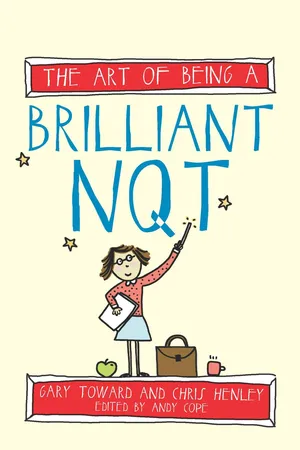Chapter 1
GETTING INTO YOUR CAREER
A finger in the wind!
There are thousands of schools out there; a pick ’n’ mix of every flavour of educational establishment waiting for the right teachers. Let’s not be too hasty though. You may well be qualified, you may well have had a great year achieving your NQT status, but this is a buyer’s market. Good teachers are hot property, so if you fall into that category, or have the potential to be good or outstanding, you can shop around.
So, it’s worthwhile setting out how to choose your best-fit school, as well as how to apply and how to approach your interview. We acknowledge that a lot of this information is fairly straightforward; however, over the years, we have discovered that ‘common sense’ is by no means ‘common practice’.
First, let’s get the types of school sorted. The pick ’n’ mix metaphor really is true. Never before have there been so many different types of school, so you need to know what you are getting yourself into before you accept a job and sign a contract. We are assuming you are sharp enough to know the difference between nursery, primary and secondary schools and the different permutations within those phases. Even so, watch out. Some areas have strange versions of these, with middle schools starting at Year 6 or Year 8 and primaries ending at Year 5. It’s crucial that you check this out to make sure it’s really what you want.
So, just to make sure you are fully equipped before we go any further, here is a summary of the main types of schools in the UK at the time of writing.
Local authority schools
These schools come in all phases and are monitored by the local authority. These used to be called local education authorities and, no doubt, will be called that again in good time. One thing you will find out about education, if you stick around long enough, is that there are few new ideas and we often return to the past wrapped up in shiny new packaging. These schools employ teachers via the local authority, with pay and conditions of service managed by the authority’s human resources department, usually at something called County Hall or City Hall. Typically, salaries, working days and holiday patterns for these schools have been agreed across the entire local area. If you have children of your own, it’s always worth checking term times to avoid finding yourself in a job where your kids have different holidays to you; a childcare nightmare!
However, there are differences even within local authorities because some schools have a structure that has been inherited from former grant maintained status. These schools were some of the first to be autonomous and not beholden to the local authority, and, as a result, many have retained the role of ‘employer’ themselves (actually it’s the governors of the school – more about them in Chapter 9). In the grand scheme of things, this shouldn’t be a worry, but it’s worth finding out if the school follows local pay and conditions or not.
Academies
An academy school is a state school that has opted out of local authority control and become a charitable trust. Often the clue is in the name – for example, the Frank Evans Academy – but not always; some schools that have converted to academy status retain their original name or invent a new one. As with the old grant maintained schools, it’s the governors who are the employers of academy staff. They are responsible for setting the school’s pay and conditions of service and have a huge degree of autonomy in this area. If you apply for a job at an academy, make sure you check this out. Most will follow the local plan, but in some cases there are radically different conditions of service with unusual holiday patterns and/or working hours.
Academies can also be part of a bigger group of schools, linked together within a larger trust. Often these schools have head teachers who are, in turn, led by an executive head teacher with responsibility for all of the schools in the trust. Typically, the whole group will have the same pay and conditions.
Free schools
Free schools can be set up by anyone who meets the requirements in an application process set out by the government. This means they do not have to follow local authority policies and may have very different pay and conditions.
Faith schools
A pick ’n’ mix all of their own! The most common faith schools are Roman Catholic (often named after a saint) and Church of England schools, but depending on your location, you may find others, such as Sikh and Islamic schools. These schools may have admission criteria linked to the associated faith but will not necessarily be exclusive. Again, ensure you check the pay and conditions policy.
Independent schools
As with state schools, there are a wide variety of independent schools. While the fact that parents, in most cases, have to pay fees may act as a natural filter, which could mean that you have fewer challenges with kids who have neither the inclination nor the aptitude to become great learners, you may also find a pressurised expectation to produce results, as paying parents expect a good return on their fees. However, as a teacher you will probably benefit from smaller classes and there are often very good facilities.
And there’s more …
Within all of these different types of schools, there are also single sex schools. Boys’ schools and girls’ schools can be very different in how they ‘feel’, so make sure you are comfortable in that environment.
Every single school has its own ethos, individual environment and unique atmosphere. You can pick up some of this by visiting the school’s website and looking at the latest Ofsted report. However, the teaching world is a small place and nothing beats a bit of insider information, so ask around and you will often find someone who can give you the inside line.
The next step is applying for a job …
Your shop window
Your letter of application is your shop window. It needs to be just like those fantastic displays that stop you in your tracks, make you walk a little closer and eventually step into the shop.
We’re going to begin with a top tip here. The number one top tip, actually, when it comes to applying for a job.
To get to first base you have to get on to the interview shortlist. To do so, you must make your application stand out.
We don’t mean with coloured paper, pictures or flashy fonts; we mean you need to personalise it to each and every job. Don’t be lazy. Don’t think you can get away with one letter of application and just tweak it. These letters stand out a mile, usually because they contain mistakes. You might be surprised but we’ve had the following beauties over the years:
♦ The wrong school.
♦ The wrong job title.
♦ An application to a boys’ school when it was mixed sex.
♦ An application to a primary when it was secondary!
♦ Best of all, this is the actual total content of a letter of application we received a few years ago: ‘I would like to apply for the post of mathematics teacher. I do not intend to write any further on the topic as I am a great teacher and you should give me the job.’ This application was quickly stored i...




